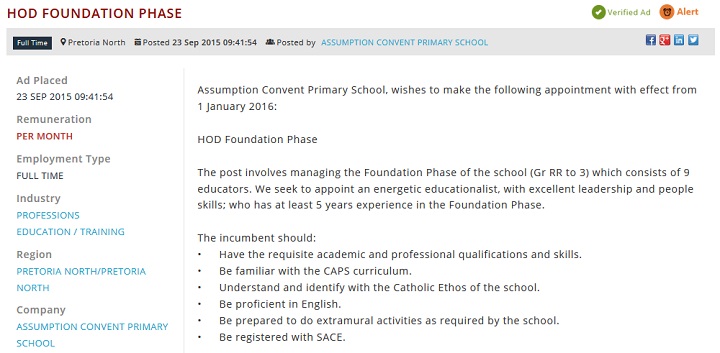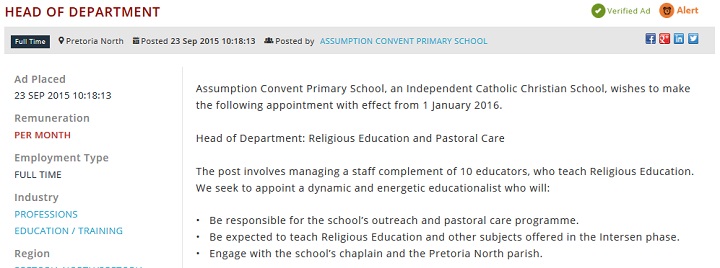A closer look at Education and Teaching Jobs in South Africa
People often see the South African education system in a negative light but things are actually looking a lot better than they did ten years ago. Contrary to popular belief, education jobs are actually on the rise and are looking to continue on this path. All the various teaching jobs in South Africa are seeing a marked improvement in job satisfaction and the amount of people going into these fields.

Stellenbosch University’s lecturer Hendrik van Broekhuizen published a paper entitled “Teacher Supply in South Africa: A Focus on Initial Teacher Education Graduate Production”. In this paper he uses data from South Africa’s own higher education management information system. He compares data from 2004 till 2013 to find trends and patterns with regards to the graduations and first time enrolments in initial teacher education (ITE) programs. Data was taken from South Africa’s 23 public universities in an attempt to highlight exactly how the education system in South Africa has changed from 2004 to 2013. We will go though some of these changes and explain why education jobs are improving.

Teacher education program enrolments
In 2004 it was found that only 13200 people enrolled at government run teacher education programs. This number increased dramatically in 2013 when it was found that up to 26500 people were enrolled. At the same time, graduations from these programs grew by 49 percent. This means that from 2004 till 2013, there were an extra 5150 teacher graduates. This clearly shows that the government is making a concerted effort to make teaching positions more attractive and more accessible to previously disadvantaged communities.

So how do non-government run teacher education programs compare? Well non- ITE education programs have always produced more teachers. Before 2008, there was a constant negative trend with regards to graduations from teacher education programs. After 2008 this started to change and the ratio began to rise. By 2013 South Africa was producing 23 qualified teachers for every 100 students that graduated from higher education institutions.
[youtube id=”l0-RK8NoPC4″ align=”center” maxwidth=”720″]
How many teachers are needed to properly fill education jobs in South Africa?
In order to maintain our current level of teachers, it has been estimated that we need between 20 000 to 30 000 teachers. South Africa produced 15 655 qualified teachers in 2013. In the same year roughly 17 000 teachers filled vacancies in public schools. These people were sourced from new graduates, people returning to the teaching profession, those coming back from teaching overseas and people that are battling to find work in other sectors. This means that we have roughly 32 655 available teachers, we can easily fill the gaps that will be left by the leaving teachers and add to the teaching pool at the same time.

What are South Africa’s teacher demographics?
As it stands, 61 percent of those working in teaching jobs in South Africa in South African public schools are females and 72 percent of people that enrolled or graduated from teacher education programs from 2004 till 2013 were also female. Males during this period declined by 4 percent.
The race of our teachers has also changed a bit: 60 percent are black, 27 percent are white, 8 percent are coloured and just 5 percent are Asian.
So what does this all mean for the education system in South Africa?
The education department has made projections based on these figures and the outlook is looking positive. The period from 2014 to 2025 suggests that the teaching system will start producing enough teachers to meet the demand in 2017. So in a few years we will start to meet the required rates of new teachers. This is great news for a country that sorely needs to educate its population to create enough skilled workers to supply the economy’s needs.
[youtube id=”v77uwHZchJs” align=”center” maxwidth=”720″]
Why you should look at going into education jobs…
- You get to experience the joys of furthering another person in life by giving them the information and expertise they need. You can also feel the satisfaction of teaching a person something new.
- This is a vocation and not merely a job. You are not just an employee at a school but rather a friend and mentor. You feel like you are part of something and not just another cog in the wheel.
- Education jobs allow you to interact with a wide variety of people every single day.
- You also become the pupil on occasion as you will learn something new from the people you are teaching and you are given up-to- date information on discoveries and new breakthroughs as you will have to pass this knowledge onto your students.
- Lastly, you get a lot of break time as you have the same holidays as your students.
Become a teacher in South Africa
There are two routes to qualifying for teaching jobs in South Africa.
1. Bachelor of Education (B.Ed)
A number of private learning facilities as well as the majority of universities in South Africa offer a 4 year degree in Education. You will need a minimum of a matric exemption and the subject score will vary between the various educational institutions. Most of these organisations will require you to pass well in the language you will be teaching in and also the subjects you will be teaching.
Once you have your B.Ed degree you can then choose one teaching phase to specialize in. So you can either specialise in the foundation phase (Grades R-3), intermediate phase (Grades 4-6), senior phase (Grades 7-9) or further education and training (FET) phase (Grades 10-12).

2. Bachelors degree + Post Graduate Certificate in Education (PGCE)
After the completion of many 3 to 4 year bachelor degrees, including: B.A, B.Tech, B.Com, B.Sc, and B.SocSci you have the option to study a PGCE. This is a one year post-graduate university qualification that allows you to become a teacher if you decide to change your original course. Depending on what subjects you completed before hand, you will be able to teach certain children in the various educational phases (explained above).
Once you have completed either the B.Ed or PGCE, and if you want to teach at a South African school, you have to register with SACE (the South African Council of Educators). SACE is a professional teaching authority body which relegates the teaching environment in South Africa.
Here are some Teaching Jobs in South Africa on Job Mail:
Principal/Nursery School Teachers
Teacher
HOD Foundation Phase
Head of Department
Are you looking for education jobs? There is a wide range of teaching jobs available, like lecturer jobs or university of Pretoria jobs. Register your CV on Job Mail and start applying for teaching jobs in South Africa today!











the first video help alot
We’re happy to hear this 🙂
Kind regards,
The Job Mail Team
This was really helpful for me. Most of this stuff I did not know about.
All this is information is relevant and helpful.we as student teachers could look at teaching as an opportunity to make a difference in peoples’s lives especially our youth.
..thank you for sharing this with us.it encourages me even more in my journey to become a teacher.
Very informative about teaching sector, eye opening but I would also like to know about ” age” is there age ristrictions to becoming a teacher, because I am fourty two years old on my journey to becoming a teacher, I love teaching, it has been my passion since then, I only now get a chance to study teaching. Thank you
Hi Nombulelo,
We’re happy to see that you’re following your passion. Teaching is a very noble profession. There is no age restriction on teaching aside from the retirement age. We’d like to suggest that you have a chat with your student advisor or one of your lecturers about your options.
Kind regards,
The Job Mail Team